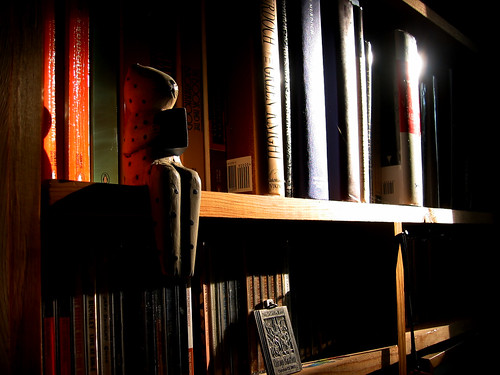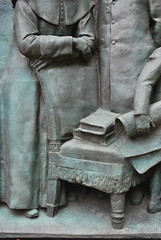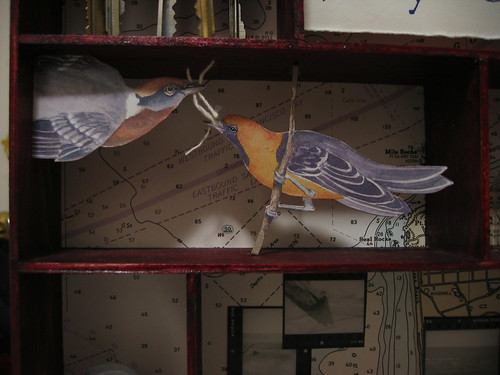For a proper review of the volume, you couldn't do better than my fellow Invisible Librarian Ed Park's for Bookforum (which I just amused myself by mistyping Bookfuror). One of Ed's most interesting observations concerns the disjunction between Wodehouse's meticulous plotting and an expressed desire for its opposite:
How interesting, then, to read what a younger Wodehouse wrote to a friend in 1914: “That is what I’ve always wanted to be able to do, to interest the reader for about five thousand words without having any real story. At present, I have to have an author-proof plot, or I’m no good.” Voice is subservient to narrative. Of course, an author as long-lived as Wodehouse will change his views on craft and ambition over the years. But in that contradiction between form and style—in a pinch, predestination and free will—lies a curious truth. Could it be that for us readers (after all, the most important part of this equation), Wodehouse in the end achieved his goal of dispensing with “any real story”? “It’s just a question of detail,” Wodehouse remarks about the composition, after the heavy lifting is done. Perhaps the aspects of his books that give us the most pleasure—the utter insouciance, the similes of fizzy genius (comparing, to pluck at random from the sacred oeuvre, a dour countenance to a “V-shaped depression off the coast of Iceland”)—could only be arrived at once the scaffolding was absolutely secure. Which is to say, a reader with much on his mind about the uncertainties of life might well have deeper reasons for immersing himself in a story called “There’s Always Golf.”It's well worth clicking through to read the rest--there are few writers whose comedic sense I trust more than Ed's, and that comes through in his choice of lines to quote.
For my part, I'll share just two of the bits that have greatly amused me as I've flipped through the book. First comes from a letter to Wodehouse's daughter, Leonora, of July 3, 1921:
Love Among the Chickens is out in the cheap edition. I'll send you a copy. Townend told me it was on sale at the Charing Cross bookstall, so I rolled round and found they had sold out. Thence to Piccadilly Circus bookstall. Sold out again. Pretty good in the first two days. Both men offered to sell me "other Wodehouse books," but I smiled gently on them and legged it.Just as Bertie would have done.
Then there's this account, sent to his friend William Townend in 1932, of a visit to H. G. Wells's house:
I like Wells, but the trouble with him is that you can never see him alone. He is accompanied wherever he goes by the woman he's living with. When they came to lunch, we were all set to listen to his brilliant table talk, and she wouldn't let him get a word in edgeways, monopolizing the conversation while he sat looking like a crushed rabbit. I did manage to get him away in a corner after lunch long enough for him to tell me that he had an arrangement with her that when he went to London, he went by himself, and he added, his face lighting up, that he was going to London next week. Then she yelled for him, and he trotted off.What makes that letter even more deliciously amusing is that--as editor Sophie Ratcliffe points out in a note, Wodehouse used that very image a mere six years later in The Code of the Woosters. Bertie explains that at the house of a newly married friend he'd seen, over the fireplace, "the legend 'Two Lovers Built This Nest,' and I can still recall the look of dumb anguish in the other half of the sketch's eyes every time he came in and saw it."
By the way, when you go to his residence, the first thing you see is an enormous fireplace, and round it are carved in huge letters the words: TWO LOVERS BUILT THIS HOUSE.
Her idea, I imagine. I can't believe Wells would have thought of that himself.
I would be falling down on one of my self-imposed Internet duties if I didn't close with some lines from Wodehouse's one letter to Anthony Powell, from 1967. A bookseller had sent him Powell's 1939 novel What's Become of Waring, and Wodehouse sent Powell a note of appreciation:
I have always admired your work so much, especially the Music of Time series. The early ones are all fine, but what I like, and what I suppose everyone likes, is the feeling that one is living with a group of characters and sharing their adventures, the whole thing lit up by the charm which is your secret. I hope the series is going on for ever. I should hate to feel that I should never meet Widmerpool again.Which leads to two thoughts:
1 It's interesting that Wodehouse likes Dance, for Powell's sense of time couldn't be more different from Wodehouse's: the latter's characters are trapped in amber, living forever in a prelapsarian (or at least pre–World War I) wonderland, while Powell's are forever moving, paced by death and driven by various and sundry furies, acted upon by time in ways they could never have predicted.
2 I'm pleased that Wodehouse uses the word "charm." It's undeniably one of Dance's great qualities, yet it's not one I've ever properly identified by that name. But Wodehouse is right: there are few books whose wit and humanity are more delicately charming than Dance.















